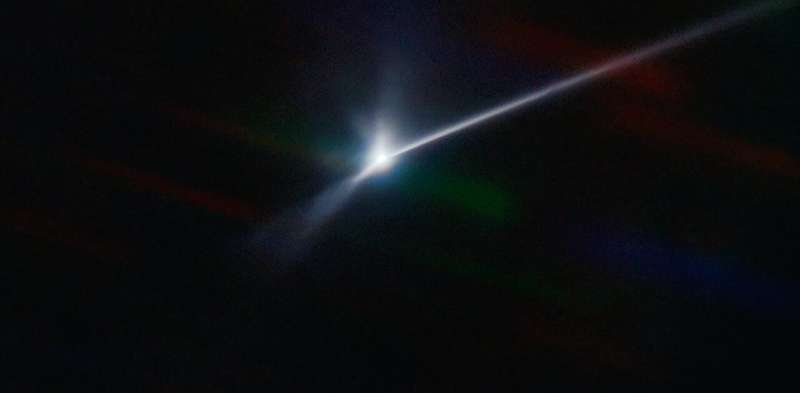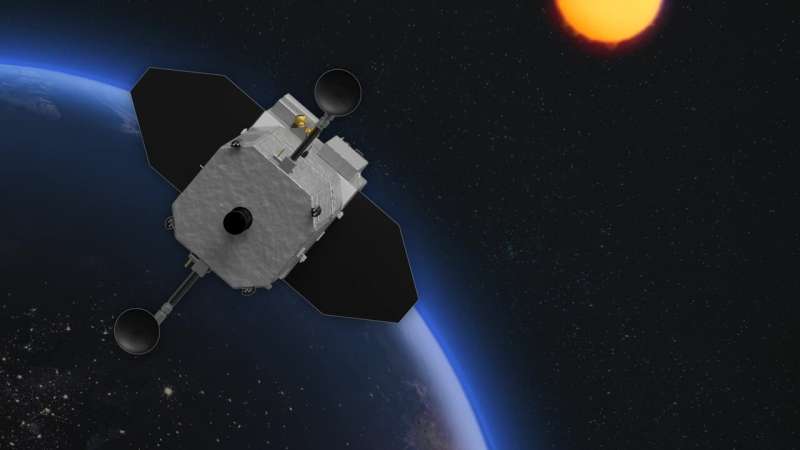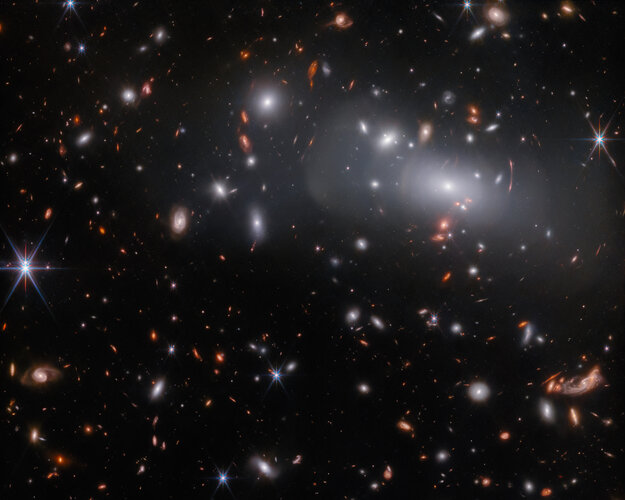
Copernical Team
First ever Canadian lunar rover will hunt for water ice on the moon
 The first ever Canadian rover to set wheels on the moon is currently under construction for a mission set to launch as early as 2026. The rover will explore the south polar region of the moon in a search for water ice in the lunar soil.
Rovers are simply "mobile robotic vehicles that allow us to explore the surfaces of other planets," explains Chris Herd, a professor in the Department of E
The first ever Canadian rover to set wheels on the moon is currently under construction for a mission set to launch as early as 2026. The rover will explore the south polar region of the moon in a search for water ice in the lunar soil.
Rovers are simply "mobile robotic vehicles that allow us to explore the surfaces of other planets," explains Chris Herd, a professor in the Department of E Solid-gas carbonate formation during dust events on Mars
 A joint research team led by Dr. Xiaohui Fu and Dr. Zhongchen Wu from Shandong University, China, proposed a new carbonate formation mechanism in Martian dust activities based on simulation experimental studies.
Carbonates are general products of aqueous processes on Earth. For Mars, carbonate minerals have been considered a sink for an early dense CO2 atmosphere. Orbital spectroscopic inv
A joint research team led by Dr. Xiaohui Fu and Dr. Zhongchen Wu from Shandong University, China, proposed a new carbonate formation mechanism in Martian dust activities based on simulation experimental studies.
Carbonates are general products of aqueous processes on Earth. For Mars, carbonate minerals have been considered a sink for an early dense CO2 atmosphere. Orbital spectroscopic inv University Teams forge forward in NASA Moon metal production challenge
 Seven university teams were selected to develop concepts supporting metal production on the Moon in NASA's 2023 annual Breakthrough, Innovative and Game-Changing (BIG) Idea Challenge: Lunar Forge.
The awards total about $1.1 million, with values between $120,000 and $180,000 based on each team's proposed concept. The challenge is a unique collaboration between NASA's Space Technology Missi
Seven university teams were selected to develop concepts supporting metal production on the Moon in NASA's 2023 annual Breakthrough, Innovative and Game-Changing (BIG) Idea Challenge: Lunar Forge.
The awards total about $1.1 million, with values between $120,000 and $180,000 based on each team's proposed concept. The challenge is a unique collaboration between NASA's Space Technology Missi Sol 3756: Sit back and wait for the data to roll in
 Today we planned a single sol plan. We are in the middle of the Tapo Caparo drill campaign. In yesterday's plan we delivered 2 portions of sample to our CheMin instrument for mineralogy. That analysis will run overnight on Mars which corresponds to the middle of the day Tuesday, on Earth. That meant we did not have any new information to react to this morning for planning.
We still have pl
Today we planned a single sol plan. We are in the middle of the Tapo Caparo drill campaign. In yesterday's plan we delivered 2 portions of sample to our CheMin instrument for mineralogy. That analysis will run overnight on Mars which corresponds to the middle of the day Tuesday, on Earth. That meant we did not have any new information to react to this morning for planning.
We still have pl Sols 3759-3761: More Analyses of the Tapo Caparo Drill Sample
 Curiosity is in the middle of a drill campaign at Tapo Caparo to characterize the rhythmically laminated unit of the Marker Band. Earlier this week CheMin got a first taste of this sample, and now it is SAM's turn.
The focus of the 3-sol weekend plan is to drop off some sample to SAM, and then perform an Evolved Gas Analysis (EGA) - which involves heating up the sample to very high tempera
Curiosity is in the middle of a drill campaign at Tapo Caparo to characterize the rhythmically laminated unit of the Marker Band. Earlier this week CheMin got a first taste of this sample, and now it is SAM's turn.
The focus of the 3-sol weekend plan is to drop off some sample to SAM, and then perform an Evolved Gas Analysis (EGA) - which involves heating up the sample to very high tempera New results from NASA's DART planetary defense mission confirm we could deflect deadly asteroids

What would we do if we spotted a hazardous asteroid on a collision course with Earth? Could we deflect it safely to prevent the impact?
Last year, NASA's Double Asteroid Redirection Test (DART) mission tried to find out whether a "kinetic impactor" could do the job: smashing a 600kg spacecraft the size of a fridge into an asteroid the size of an Aussie Rules football field.
Early results from this first real-world test of our potential planetary defense systems looked promising. However, it's only now that the first scientific results are being published: five papers in Nature have recreated the impact, and analyzed how it changed the asteroid's momentum and orbit, while twostudies investigate the debris knocked off by the impact.
The conclusion: "kinetic impactor technology is a viable technique to potentially defend Earth if necessary".
Humans are still hunting for aliens: Here's how astronomers are looking for life beyond Earth

We have long been fascinated with the idea of alien life. The earliest written record presenting the idea of "aliens" is seen in the satiric work of Assyrian writer Lucian of Samosata dated to 200 AD.
In one novel, Lucian writes of a journey to the Moon and the bizarre life he imagines living there—everything from three-headed vultures to fleas the size of elephants.
Now, 2,000 years later, we still write stories of epic adventures beyond Earth to meet otherworldly beings (Hitchhiker's Guide, anyone?). Stories like these entertain and inspire, and we are forever trying to find out if science fiction will become science fact.
Not all alien life is the same
When looking for life beyond Earth, we are faced with two possibilities. We might find basic microbial life hiding somewhere in our Solar System; or we will identify signals from intelligent life somewhere far away.
Unlike in Star Wars, we're not talking far, far away in another galaxy, but rather around other nearby stars. It is this second possibility which really excites me, and should excite you too.
Europe's Vega-C rocket failure traced to defective engine part: ESA

The failed launch of a Vega-C European rocket in French Guiana last December was due to the deterioration of a key engine component that resulted in a rapid loss of boosting power, European Space Agency officials said Friday.
The launching from the Kourou space port would have been the first commercial launch for the Vega-C and presented a new option for European space payloads after numerous delays to the next-generation Ariane 6 rocket and cancelled Russian cooperation over the Ukraine war.
But shortly after lift-off on December 21 with a payload of two observation satellites, the rocket deviated from its programmed trajectory and communications were lost, forcing officials to destroy it over the Atlantic Ocean.
An ESA investigative panel found that pressure in the Zefiro 40 motor, made by Italy's Avio, had started falling during the second stage of lift-off, the commission's co-president Pierre-Yves Tissier told journalists.
At three minutes 27 seconds after the launch, "the rocket's acceleration had fallen almost to zero," he said.
Investigators determined that a nozzle neck supposed to ensure constant combustion pressure in the motor had failed to resist the enormous pressure and temperatures reaching 3,000 degrees Celsius (5,432 degrees Fahrenheit).
Scientists discover answer to the mystery of cloudy filters on satellites

Week in images: 27 February - 03 March 2023

Week in images: 27 February - 03 March 2023
Discover our week through the lens
